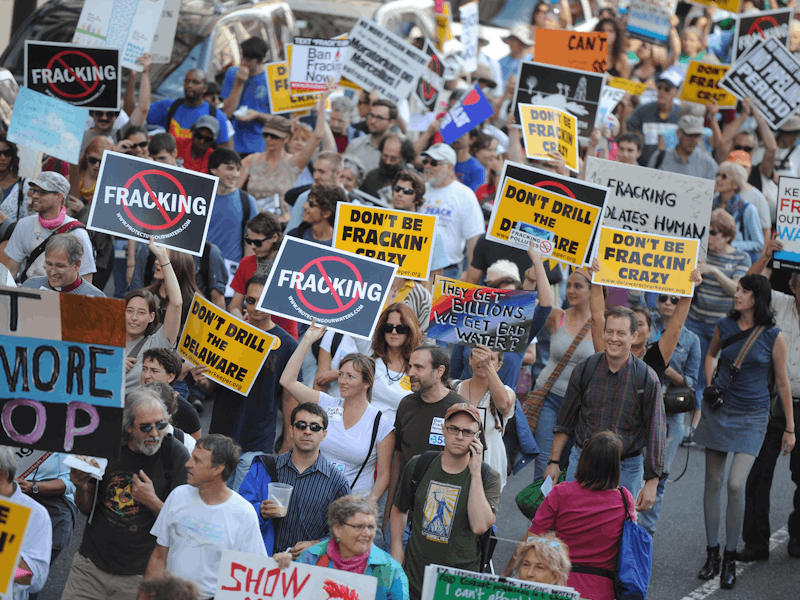Why Are More Americans Rejecting the "Environmentalist" Label?
A recent Gallup poll shows that there are fewer self-identified environmentalists now than 25 years ago.

Though climate change is widely considered one of the world’s most pressing problems heading into the 21st century, fewer and fewer Americans are identifying themselves as “environmentalists.” A recent Gallup poll shows that the number of Americans who consider themselves “environmentalists” has dropped 34% over the past 25 years.
Experts point to political polarization of environmental issues here in the U.S. over the past few decades being the main culprit for the decrease of self-identifying environmentalists. In 1991, a whopping 79% of both Democrats and Republicans identified as environmentalists. Today, while self-identification has decreased on both sides of the aisle, Democrats are nearly twice as likely to self-identify with the term; only 27% of Republicans identified as environmentalists, while 56% of Dems positively identified with the term. In the current election cycle, acknowledging environmental issues seems like it has been anathema for candidates on the right, meanwhile voters on the left have criticized the lack of substantive questions on the environment in this season’s Democratic debates.
The environment became the hottest debate topic for Clinton and Bush in the 1992 elections.
It should be pointed out that the environment was just as politicized a quarter century ago as it is today, but not nearly as partisan. 25 years ago, the environment dominated the political debate in this country, but as opposed to one party denying the existence. In fact, in the 1992 election, the environment was perhaps the single biggest issue: incumbent Republican George Bush and challenger Bill Clinton fought tooth and nail to prove to voters who was the more environmentally friendly president.
However, the decrease of self-professed environmentalists may be less a matter of fewer and fewer Americans giving a shit about the environment, and more a matter of semantics. On the whole, we Americans practice more environmentally friendly behaviors than we ever have. Recycling, reducing energy consumption, and a putting a priority on buying environmentally friendly products have become commonplace; it’s possible that for many, the term “environmentalist” may now infer some sort of environmental activism. According to a recent Pew Research study, almost 74% of U.S. adults support protecting the environment, despite the shrinking numbers of people willing to self-identify as environmentalists.
Things like buying electric cars and installing solar panels on homes—something that would have been considered fairly radical even a decade ago— are now what “normal” folks do. Meanwhile, the goal posts have shifted to the point where “environmentalism” means more extreme measures like occupying bridges or laying a whooping down on illegal whaling ships.
That being said, other polls do lend some credence to the fact that titles aside, Americans are actually less concerned about a number of individual environmental issues now than they were in 1989. Respondents in 2016 are less likely to be concerned about pollution in the air and water. Even after the highly publicized lead poisoning incident in Flint, Michigan, Americans were still less concerned with pollution in drinking water than they were in the late 80’s.
There has always been a certain level of cognitive dissonance when it comes to Americans and the environment: for decades, we have been able to recognize the conceptual severity of environmental issues, while distancing ourselves from the real world consequences or possible solutions. In the 1970’s, the majority of Americans were aware that air and water pollution were an issue, but put a priority on creating jobs, even “dirty” jobs that relied on massive amounts of pollution creation.
Today, though almost 3 out 4 Americans do believe “country should do whatever it takes to protect the environment,” less than half of Americans believe that the environment should be a priority for the government. According to a January Pew Research study, environmental policy was ranked less of a priority as the economy, terrorism, health care costs, immigration, and budget deficit reduction.
It’s probably best not to read too much into the trend of decreasing number of Americans self-identifying as “environmentalists.” Indeed, we have adopted more environmentally friendly behaviors now than in the past half-century, but there is a near consensus in the scientific community that climate change is a very real thing, and the planet is heading toward a wide-scale environmental crisis.
However, after making such significant strides in raising awareness and most importantly a societal push to consciously change environmental behaviors, it’s important we don’t get too complacent. We’re doing better than we used to, but most experts would argue that labels be damned, we’re still not doing enough.